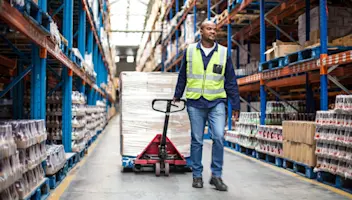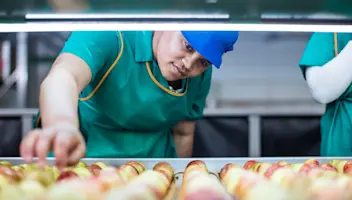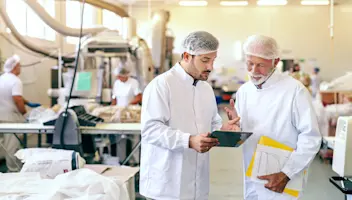Leveraging Technology to Stay Up-To-Date with Food Industry Trends
Leveraging Technology to Stay Up-To-Date with Food Industry Trends
Leveraging Technology to Stay Up-To-Date with Food Industry Trends
15 Avr 2020
Aptean Staff Writer
As a food manufacturer or processor, you know the importance of staying ahead-of-the-curve in terms of emerging industry trends. Think about it like this: the year is 2009 and your soda company is producing more product than ever before. Fortunately, you’re aware of a Robert Wood Johnson Foundation report released earlier that year that highlights the issue of obesity across the U.S. and outlines a number of recommendations to help prevent and reduce the rate of obesity in children. With this knowledge, you sit down with your R&D team to create a healthier, less sugary beverage option to sell to schools across the country. The result? Unlike your competitors who neglected to stay current on industry trends, your company exceeds profit targets for the following five years.
But sometimes staying current and up-to-date isn’t enough. Without the ability to quickly and accurately leverage your R&D team to experiment with new formulas and ingredients in the example above, you too may have missed out on capitalizing on this emerging trend. Staying up-to-date with industry trends and leveraging technology, like an enterprise resource planning (ERP) solution designed for the food and beverage industry, will allow you to effectively plan ahead and grow your business.
Below, we’ve highlighted three food and beverage industry trends for 2020 and outline how leveraging an ERP solution will help your company get ahead.
1. Labor
According to an estimate from Deloitte and the Manufacturing Institute, as many as 4.6 million industrial jobs may go unfilled over the next decade or so. This is a result of a combination of factors: the decline in America’s working-age population, the current hostile political climate towards immigration (which has traditionally provided much of the food industry’s workforce) and the difficulty in attracting young people to jobs in food plants, which are often regarded as undesirable work environments (noise, heat, smell, etc.).
For food manufacturers and processors who rely on skilled workers for production, manufacturing, inventory management and shipping on the shop floor, this estimate is terrifying. In an industry with incredibly small margins and mounting pressure to keep production costs down, it’s never been more important for food companies to future-proof their operations.
How Leveraging Technology Can Help
Food manufacturers and processors relying on legacy systems or spreadsheets to run their business risk losing the inherent knowledge that tenured employees possess if and when they leave the company. Here’s an example: Bob has been with Smith Foods for 30 years and is in charge of the company’s production planning. He has spreadsheets and makeshift systems to run all of Smith Foods’ production and business is great. But Bob is planning to retire this year and no one else on the shop floor has had the time to learn and really understand Bob’s processes and systems. Information such as preferred production sequencing, unique resource capabilities and overall scheduling processes could be potentially lost with Bob’s departure. As a result, Smith Foods will likely struggle with production and miss some of its targets over the next few months or maybe even years.
With an ERP designed for the food industry, all of the production, manufacturing, finance, purchasing, sales and inventory data that drives your business lives within the system, so as employees come and go, none of that information or knowledge is lost. Additionally, being able to train new hires on a user-friendly, streamlined solution will reduce new employee onboarding time, resulting in more productivity and more overall business growth.
2. Trade
Foreign trade has never been a bigger global issue. As additional tariffs are put on various imports and exports and markets plunge and then soar the following day, it’s no surprise that the food industry is facing an overwhelming sense of uncertainty.
These quick changes in the market coupled with U.S.-mandated regulations and tariffs make it hard for food manufacturers and processors to anticipate industry patterns and rely on the cause and effect relationship in terms of demand that traditionally drives production. This uncertainty makes it almost impossible for food companies that are dependent on foreign trade to appropriately plan and budget.
How Leveraging Technology Can Help
It’s never been more important for food companies to have the ability to drill down into their inventory, finance and manufacturing data. The end-to-end visibility a solution like an ERP provides to food manufacturers and processors gives them the insight and control needed to better address market uncertainty and act quickly and rationally to changing requirements, regulations and consumer needs.
Here’s an example: Suzie’s Cookies has been using an industry-specific ERP system for years. As a result, it runs extremely lean and doesn’t have an excess amount of inventory tying up its working capital. Suzie’s Cookies has full visibility into how its inventory levels impact its customers and the cash flow required to cover unexpected costs in times of uncertainty.
Technology like an ERP solution also allows food companies to use this end-to-end visibility to maintain prices and stay competitive in a tumultuous market. Though tariffs and trade regulations can impact the price of products and ingredients, features found in food-specific software – like yield management, catch weight analysis and detailed production costing – can help your company keep prices competitive.
3. Transparency and Traceability
Transparency – the process of openly sharing how food is produced – and traceability – the process of tracking products through the supply chain from start to finish – are still the biggest trends in the food industry and are likely not going anywhere anytime soon. Transparency and traceability have always been issues for large manufacturers and processors who struggle with connecting to the end consumer and reinforcing claims of authenticity like “local” or “ethically grown.”
Transparency and traceability create a sense of brand legitimacy for consumers and provide them with a sense of security in the event of a recall or contamination. But this can work the opposite way too: food companies that are forced to perform a recall, for example, not only face millions of dollars in direct costs associated with the recall, but also suffer intense brand damage and lost sales.
How Leveraging Technology Can Help
An ERP designed specifically for the food industry provides food manufacturers and processors with the food safety functionality needed to keep consumers safe. Features inherent to an ERP for the food industry include bi-directional ingredient traceability, allergen management and inventory entry compliance and give manufacturers and producers the insight they require to comply with food safety regulations.
Here’s an example: Sauces Plus is a manufacturer of all-natural soups and sauces. The company implemented a food-specific ERP last year and, as a result, can track its ingredients back and forth through the production cycle. Sauces Plus includes a QR code on each of its products that, when scanned, gives consumers detailed information about some of the ingredients included in each product. This transparency creates a sense of brand loyalty and authenticity for consumers.
Keeping up-to-date with new and emerging trends is increasingly important for food manufacturers and producers looking to grow their businesses. As demands in labor, global trade and transparency shift, food companies are continually forced to reevaluate their operations and stay ahead of the curve. That’s why the most successful food manufacturing and processing companies invest in industry-specific ERP solutions to run their businesses. Software that connects departments, data and processes into a single platform allows food companies to have full visibility into their operations, giving them the insight and control needed to capitalize on trends and take their business to the next level.
Learn more about Aptean’s food-specific ERP solutions and see if they are right for your business by reaching out to us. We’d love to talk.
Food Insights


Prêt à transformer votre entreprise ?
Nous avons les solutions ERP spécialisées dont vous avez besoin pour relever les défis de votre secteur.






